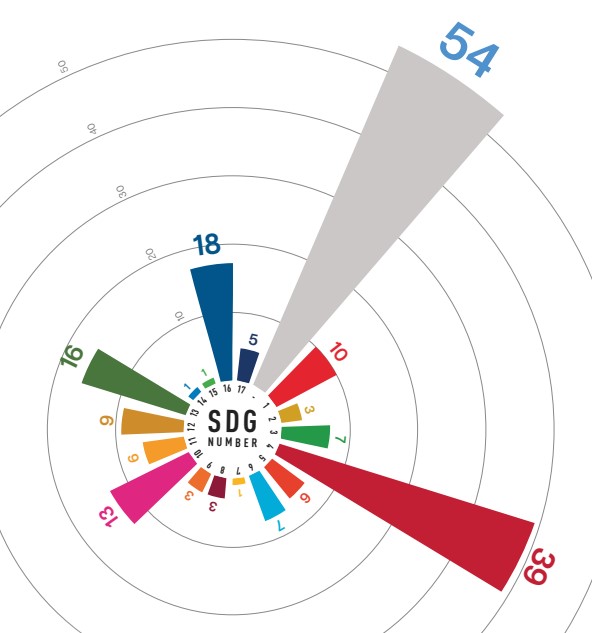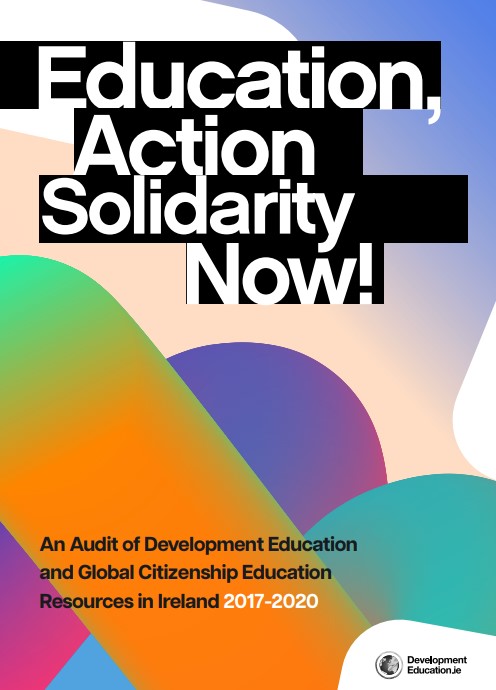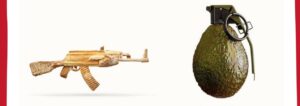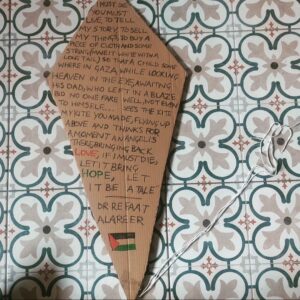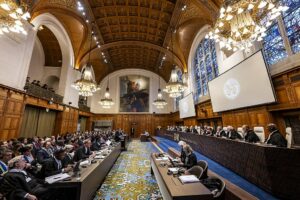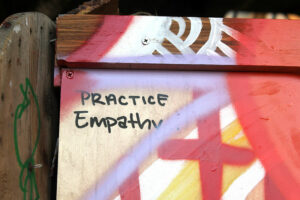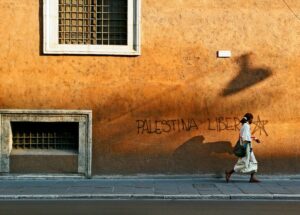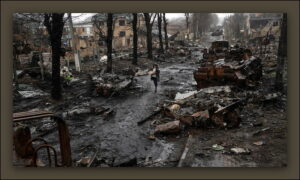Graphic: summary of the main Sustainable Development Goal per resource 2017-2020, chart 4.2 from Education, Action, Solidarity, NOW! An Audit of Development Education and Global Citizenship Education Resources in Ireland 2017-2020. Graphic by Dylan Creane / developmenteducation.ie
For writers, educators, funders and DIY education materials alike, this study is part of the ongoing research agenda to monitor, evaluate and take stock of development education (DE) / global citizenship education (GCE) learning resources produced in Ireland.
When the history is written on the Sustainable Development Goals (SDGs) upon their conclusion in 2030, the first trimester years from 2015 – 20 could potentially be seen as some of the more turbulent and challenging years in the march to a low carbon, more sustainable world. Resistance to these potential pathways was in full flight, both within Ireland and internationally. Engaging with these stories and contexts to make them immediate, accessible and interesting as spaces for learning and engaging the public (not just policy), continues to be essential.
Launched in September 2022, the third ‘audit’ of resources produced from Ireland on global issues for educational use is the largest in its scope and size to date.
In the continuously changing landscape of education and international development, there is a need to support evidence-based resource production that builds on practitioner skills and knowledge, invest in innovation and collaboration, widen opportunities throughout the resource lifecycle (from piloting to impact) and foster a balance of education, development issues and realities that critically engage with Agenda 2030, human rights-based approaches and beyond.
Resources projects by type of format
Education, Action, Solidarity, NOW! An Audit of Development Education and Global Citizenship Education Resources in Ireland 2017-2020 covers 202 resource projects, and includes:
- Findings, gaps, and recommendations across formal and non-formal education sectors and 9 recommendations to resource writers, producers and donors.
- Graphics: 7 charts and 16 tables
- 5 case studies, on: 1. The Greta Effect; 2. Innovations in Gamification; 3. Data and the SDGs; 4. ‘Pick and Mix’ and anchors; and 5. A practitioner’s guide to implementing Education for Sustainable Development in formal education
11 findings – in summary
1. A total of 30 resource themes were identified during the Phase 3 period across the 202 resources.
2. The three dominant themes emerging are development education practice, development education methods and the Sustainable Development Goals (SDGs) and sustainable development, followed by climate change and human development.
3. The least covered themes are debt and trade, decent work and economic growth, affordable and clean energy and humanitarian emergencies.
4. The main format of each resource project, was dominated by ‘activity pack’ formats. The findings, however, are more diverse than just that. Digital productions have shifted the number of resources that accompany a resource project. Microsites and multimedia, representing 6% of resources, were produced exclusively in those formats.
5. Mirroring the previous two audits (2000- 2012 and 2013-2016), Irish Aid, their post primary GCE/DE grant scheme via Worldwise Global Schools and a small number of development agencies account for a significant proportion of resources produced overall in Ireland. Together, these bodies are making the most important investments towards resourcing the sector (more specifically, resources that account for Goal 4.7 in the SDGs).
6. Phase 2 of the Audit has been integrated into the Irish Aid Development Education Annual Grant Guidelines documents from 2018-2021, the Worldwise Global Schools grantee reports and was included in the development phase of the Code for Good Practice for Development Education (alongside the Guidelines for Producing Development Education Resources), to name but a few.
7. 65% of all resources audited were developed for the formal education sector, and 26% for the non-formal sector (the remaining 6% and 3% for the general public and for DE practitioners respectively).
8. While the SDGs were one of the most common themes throughout Phase 3, the coverage of specific/individual SDGs is lacking, whereas general overviews of the SDGs are well covered. Looking at the majority of activity, 92% of resources produced concentrated on 58% of the SDGs. Of the remaining 8% of resources, these covered the remaining 42% of SDGs. To illustrate how thinly spread this coverage is, 5 resources or less accounted for 7 SDGs out of 17.
Many resources have introduced the SDGs and Agenda 2030, and remain at an introductory ‘bird’s eye view’ perspective without substantively drilling into key issues and debates contained within the targets (or left out of the targets). Critical engagement with this agenda must move beyond awareness raising as part of building critical literacy on the SDGs themselves. (‘SDG literacy’)
9. While planning for thematic work over time is crucial, resource producers should consider diversifying thematic approaches in order to energise the connections between different SDGs and to move beyond introductory materials alone. Again, however, it remains unclear as to whether this reflects the demand for resources on the SDGs or not.
10. Areas which continue to remain to be the least serviced are children’s rights and justice, among others such as women’s rights and development itself. Tracking the ‘solidarity’ and development perspectives in resource projects need to be considered and included proactively, where appropriate.
11. From the beginning of this entire audit process, many resources were excluded as a result of being presented as educational resources when their focus was more on organisational branding with suggested actions of fundraising etc. While the practice has not entirely gone away, particularly with some international NGOs operating in Ireland, it has decreased. The proliferation of good practice codes in the sector has played an important role – and continues to.
9 recommendations (summarised here)
1. Convene a forum as an appropriate, partnership-based space on the need and relevance for resources on particular themes, curriculum areas and potential lessons based on practice.
2. Continue to invest in the maintenance, database upgrades and usability / marketing opportunities that the DE sector-wide developmenteducation.ie resources library has established.
3. Support for innovation and testing new methods, formats and practices in education, training, resource production and action projects should be expanded.
4. Research matters, and should be reintroduced as part of building a consistent and visible evidence-based GCE agenda in Ireland.
5. Funding modalities should continue to grow and support flexible production cycles.
6. Update the Guidelines for Producing Development Education Resources.
7. Professional development opportunities should be expanded and acknowledged by supporting organisations and funders so that resource writers, producers and teams have structured opportunities to update their practice in terms of access to curriculum updates and innovations as well as current issues on the international development landscape.
8. Planning to secure, distribute and safeguard resources – in various formats – should be considered early on in resource project developments.
9. Opportunities to support good practice in the development of DE/GCE resources should be pursued in policy work, in informing and building critical awareness through sector events, forums, public consultations and initiatives supporting institutional cooperation in Ireland and elsewhere.
There is something for everyone in the audit – resource writers, education leaders, facilitators, donors and support workers alike.
- The report launch event took place on the 9th September and was supported in more detail at a workshop led by the Irish Development Education Association on 14th September, Production, Impact and Continuous Learning: Let’s talk ‘resources’
- Take a look at our resources library – Ireland’s largest digital library for digital citizenship education and development education resources
- Workshops / event requests: for presentations, workshops, media requests and participation of the team in your events programme send requests to: contact [at] developmenteducation.ie
About the authors
Tony Daly and Ciara Regan are the lead authors of Education, Action, Solidarity, NOW! An Audit of Development Education and Global Citizenship Education Resources in Ireland 2017-2020 by developmenteducation.ie and have been involved in the previous editions of the audit in 2016 and 2013.
About the Resources Audit Project
This study is part of the ongoing research agenda to monitor, evaluate and
take stock of development education (DE) / global citizenship education
(GCE) learning resources production in Ireland:
- 2012-13 Phase 1: research and publication of the audit of development education resources published between 2000–2012 and 2013-14 circulation and active engagement of the audit across education sectors, including publication of Guidelines for Producing Development Education Resources (2014) by developmenteducation.ie, Dóchas and the Irish Development Education Association.
- 2013-16 Phase 2: updating of the audit and taking stock of audit exercise in intervening four-year period of 2013–2016 inclusive.
- 2017-20 Phase 3: circulation, promotion and active engagement of the Phase 2 audit across education sectors, updating of the audit and taking stock of audit exercise in intervening four-year period of 2017–2020.

